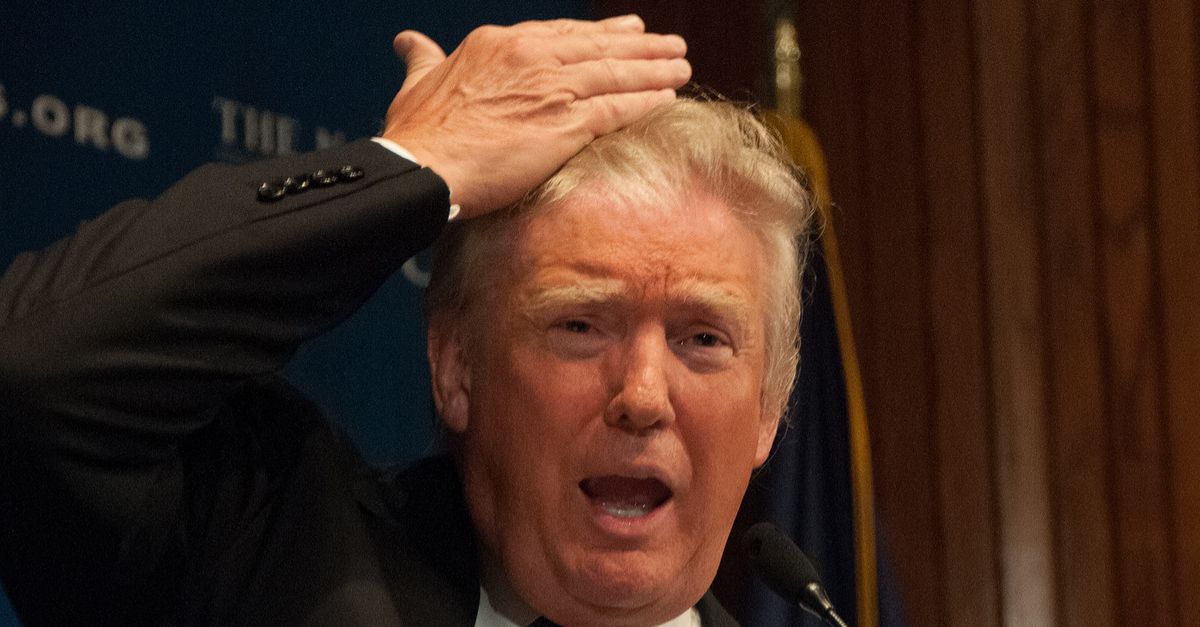A Washington, D.C.-based public accountability group has filed a lawsuit against President Donald Trump, alleging that his foreign business ties put him in violation of the U.S. Constitution.
Citizens for Responsibility and Ethics in Washington (CREW) filed the federal lawsuit on 23 January 2017 in New York, claiming that Trump has breached a constitutional clause that forbids gifts from foreign powers to U.S. officials, citing fears by the nation's founders that such payments could compromise the loyalty of public office holders. On 23 January 2017, the New York Times reported that the U.S. Justice Department will defend Trump in the lawsuit.
Article 1, Section 9, Clause 8 of the Constitution (commonly known as the "Emoluments Clause" reads:
No Title of Nobility shall be granted by the United States: And no Person holding any Office of Profit or Trust under them, shall, without the Consent of the Congress, accept of any present, Emolument, Office, or Title, of any kind whatever, from any King, Prince, or foreign State.
According to the complaint, Trump is in violation of that clause:
[CREW's] logic is that the clause prohibits Trump from taking any money at all from a foreign state. To them, the clause prohibits not just straight-up gifts but also payments for services rendered. So it would prohibit a Trump-owned hotel from renting a ballroom to a foreign embassy and prohibit Trump Tower from renting out office space — as it already does — to a state-controlled Chinese bank.
In their complaint, they ask a federal judge to stop Trump’s businesses from taking those payments.
“A federal officeholder who receives something of value from a foreign power can be imperceptibly induced to compromise what the Constitution insists be his or her exclusive loyalty: the best interest of the United States of America,” the group wrote in its legal filing.
Trump announced during a press conference that he would turn management of his businesses over to his two sons, Eric and Donald, Jr., but did he not include plans to relinquish ownership or establish a blind trust. His attorney said Trump is not running afoul of the Emoluments Clause because his businesses are accepting payments for services rendered, not gifts, from representatives of foreign countries.
CREW's complaint lists a number of locales, including Russia, Saudi Arabia and Taiwan, where Trump has significant business interests. For instance, the Industrial and Commercial Bank of China (ICBC), a state-owned commercial Chinese bank, is one of the largest tenants in New York Trump Tower, a mixed-use skyscraper on Fifth Avenue. Another tenant in the landmark Manhattan building is the Abu Dhabi Tourism and Culture Authority, an entity owned by the United Arab Emirates. The complaint quotes Donald Trump, Jr., in 2008 saying "Russians make up a pretty disproportionate cross-section of a lot of our assets... We see a lot of money pouring in from Russia."
The complaint cites media reports of foreign envoys flocking to Trump's Washington, D.C., hotel in an effort to curry favor with the new world leader:
Defendant regularly receives money — and, without judicial intervention, will continue to receive money during his presidency — each time a foreign state, a foreign diplomat, some other agent of a foreign state, or some other instrumentality of a foreign nation stays in a room or pays for a venue or other service in Defendant’s D.C. hotel. Now that he is President, Defendant’s acceptance of any such payments without congressional consent, including for inauguration-related reservations, constitutes a violation of the Foreign Emoluments Clause; Defendant, as a “Person holding any Office of Profit or Trust,” is “accept[ing]” an “Emolument” from an agent or instrumentality of, or directly from, a “foreign State,” without “the Consent of the Congress.”
The Brookings Institution notes why the Founding Fathers considered gifts and the potential influence of foreign interests to be a threat:
While much has changed since 1789, certain premises of politics and human nature have held steady. One of those truths is that private financial interests can subtly sway even the most virtuous leaders. As careful students of history, the Framers were painfully aware that entanglements between American officials and foreign powers could pose a creeping, insidious risk to the Republic. The Emoluments Clause was forged of their hard-won wisdom. It is no relic of a bygone era, but rather an expression of insight into the nature of the human condition and the preconditions of self-governance.
When we contacted Trump adviser Sherri Dillon for comment, her office directed us to Amanda Miller with the Trump Organization, saying only, "We do not comment on our clients or the work we do for them.'
We haven't heard back from Miller, but Trump spokeswoman Hope Hicks told the Associated Press that Dillon "was very clear on this issue and nothing has changed; the president has no conflicts."
As the Washington Post noted, we won't know how the lawsuit will fare unless and until it reaches a courtroom:
Dillon said that Trump would turn over “profits” from foreign governments at his hotels to the U.S. treasury. It is unclear, however, exactly how Trump’s businesses would calculate that, because the Trump Organization hasn’t provided any details on how such payments would be tracked, collected and dispersed.
Is that enough?
“Too many people are asserting more than they could possible know,” said Seth Barrett Tillman, a lecturer on American law at Maynooth University in Ireland who has studied the Emoluments Clause. “Until the courts speak — particularly the Supreme Court — we don’t know.”
